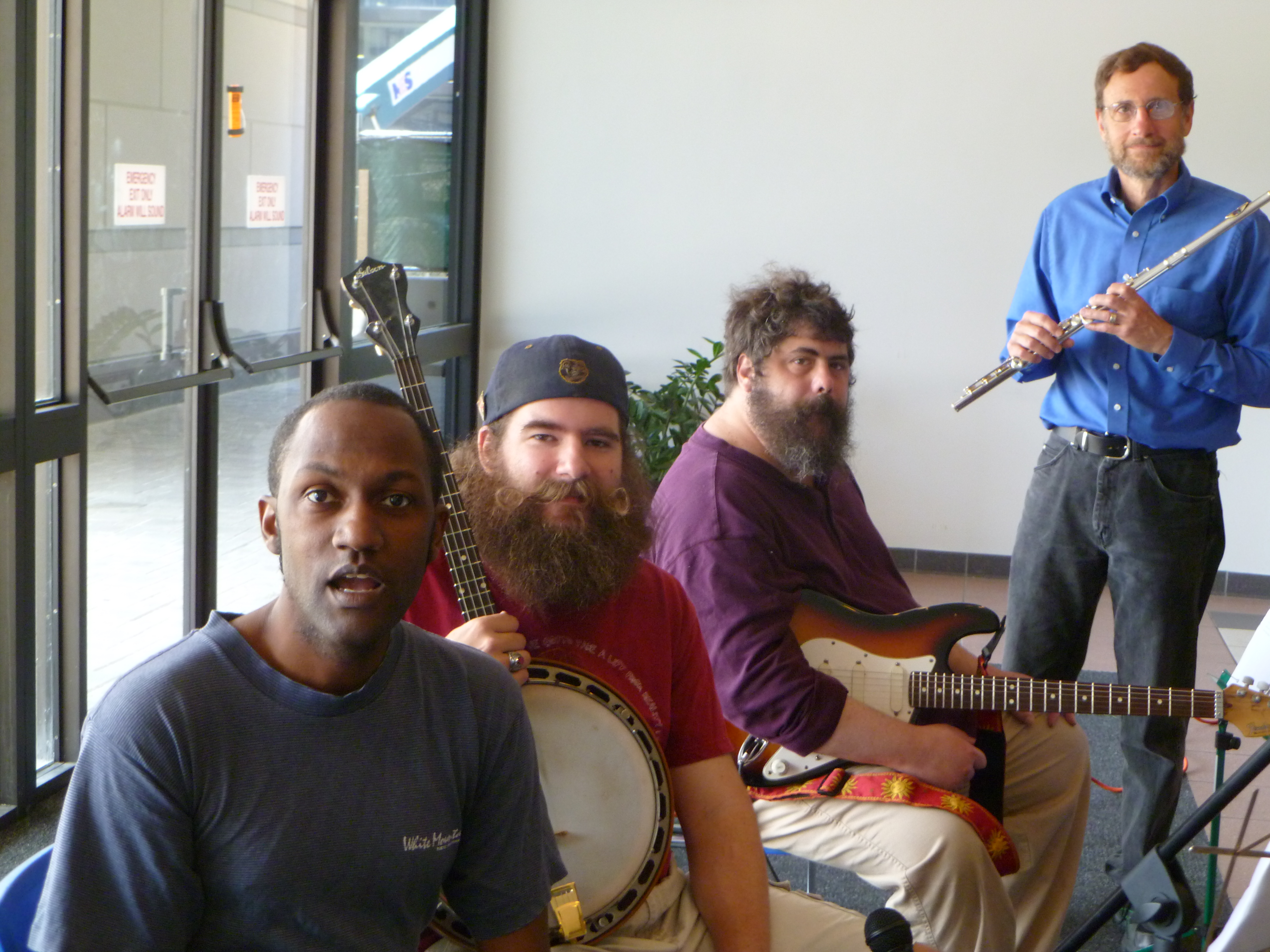
The Jaques Ave Five is a local band whose membership includes clients and clinicians from Community HealthLink. Core players (left to right) Torrence Hargrove on keyboard, Scott Johnson on banjo, Chris Spaziante on guitar and Dr. Birnbaum on flute, performed at the 27th Annual Public Sector Psychiatry Conference held at UMass Medical School on June 15. Not pictured is bass player Adam Montieth.
“Mindfulness means paying attention in a particular way: On purpose, in the present moment, and non-judgmentally,” wrote Jon Kabat-Zinn, PhD, professor emeritus of medicine and founder of the internationally renowned Center for Mindfulness in Medicine, Health Care and Society at UMass Medical School. Mindfulness is a therapeutic physiological state that can be achieved through a variety of practices and techniques that can be taught and learned, making it a powerful tool for individuals struggling with mental illness, as well as a beneficial personal practice for clinicians who treat them.
Known as a worldwide mecca for mindfulness in medicine, UMass Medical School was an appealing destination for the many behavioral health care providers and consumers who attended the 27th annual Public Sector Psychiatry Conference, “Using Mindfulness for Improving Care of Patients with Serious Mental Illness and Clinicians’ Self-Care.”
Hosted by the Department of Psychiatry on June 15, the daylong conference familiarized psychiatrists, psychologists, nurses, social workers, patients and family members with how mindfulness can improve the therapeutic encounter and its consequences for both the individuals receiving and providing the therapy. After learning about the current evidence for the effectiveness of mindfulness-based interventions for depression, anxiety and wellness, participants received instruction in mindfulness meditation techniques so that they could use those practices for themselves and coach others in using them.
“I was just tickled to find a conference that would directly examine using mindfulness in clinical psychiatry,” said Peter Newsom, MD, who traveled from California to attend the conference. Formerly an emergency medicine physician and now dually certified in adolescent and adult psychiatry, Dr. Newsom has long practiced mindfulness techniques himself and frequently
teaches them to patients. He first found mindfulness helpful for himself and patients in the emergency department, a stressful environment for doctors and patients alike.
“The E.R. was a great place to learn about being mindful as a physician,” he said of the intersection between personal and medical practice. He found that even a quick lesson in mindfulness techniques could be helpful to many afflicted with panic attacks, a frequent diagnosis in the emergency room. “Whether I help a patient learn yoga, breathing techniques, mindfulness meditation or even neuro-feedback, all are ways to help the patient.”
Newsom now regularly incorporates mindfulness into treatment for his adult and adolescent patients, as well as drug prevention talks he gives at local schools, where he recommends mindfulness as a potent and non-addictive alternative to illicit drug and alcohol use by teens seeking ways to improve their moods.
Further demonstrating the broad scope of mindfulness practices and how they can be integrated into treatment and daily life were members of the band Jaques Ave. Five, a musical group that performed in the old Medical School lobby during the lunchtime break. Organized by Community Healthlink (CHL) psychologist Alan Birnbaum, PhD, affiliate in psychiatry, the band is composed of musicians who are CHL clients battling major mental illnesses.
“We use a ‘rehabilitation through strength model,’ and band members all have music as a strength,” explained Dr. Birnbaum, who also finds playing clarinet with the band to be personally therapeutic. “When the band is working together we’re not thinking about problems, we’re all just in the music and in the present. We are definitely practicing mindfulness in public sector psychiatry!”
Related links:
Mindfulness leads to healthier patients, happier doctors